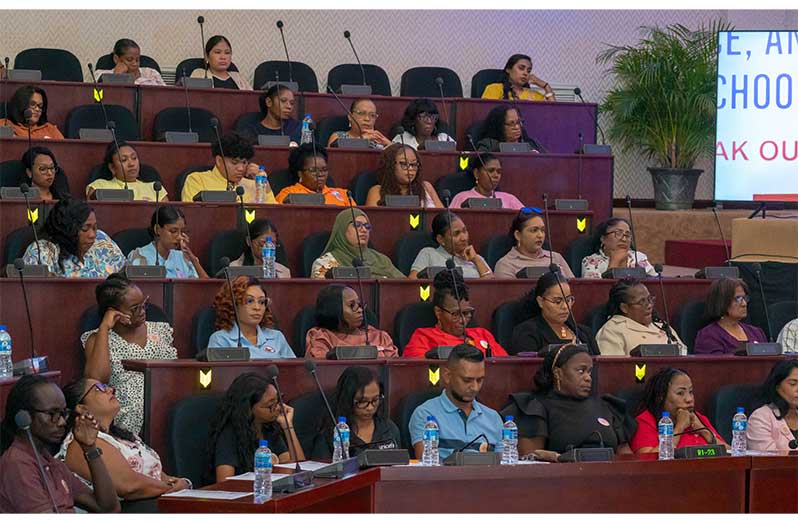—at public consultation on anti-violence & anti-bullying policy in schools
MINISTER of Education, Sonia Parag, has reaffirmed her ministry’s commitment to fostering safe and respectful learning environments, as she officially launched a new online anti-bullying platform and announced the upcoming introduction of moral and civic education into the national curriculum. 
The announcement was made on Saturday during the first Public Consultation on Anti-Violence and Anti-Bullying Policy in Schools, held under the theme “Stand Up. Speak Out. Stop It.” at the Arthur Chung Conference Centre, Liliendaal, Greater Georgetown.
In her address, Minister Parag emphasised that bullying in any form must be met with a zero-tolerance approach, noting that it requires a collective and sustained effort across the education system.
“Bullying is by no means right in any form. We must take a zero-tolerance approach,” she declared, urging parents, teachers, students, and policymakers to play active roles in creating safe school environments. She explained that bullying is not limited to student-on-student interactions but also extends to teachers, parents, and entire school communities.
“Bullying is not only student against student; it’s school against school, teacher with student, student with teacher, parent with teacher, and teacher with parent,” she said.
Minister Parag underscored the need for an honest discussion on the issue, noting that “repeatedly transferring a student from one school to the next is transferring the problem.”
Highlighting the ministry’s latest digital innovation, Parag announced the launch of a secure online platform – the Anti-Bullying and Anti-Violence Reporting System – designed to allow students, parents, and educators to report bullying confidentially.
“This secure digital tool allows students, parents and staff to confidentially report incidents of bullying or harassment without fear of retaliation,” she stated.
She added that the system “streamlines communication between schools and the ministry, enabling timely investigations and appropriate interventions while maintaining the privacy of all individuals involved.”
Minister Parag said the goal of the platform is to “promote accountability, encourage a culture of respect, and strengthen the overall well-being of students.” She assured that reports made through the system would remain confidential and that the Ministry of Education would ensure privacy “whether it’s the student, the teacher, or the parent.”
Turning to the education curriculum, Minister Parag announced that moral and civic education would soon be formally introduced into schools as part of efforts to nurture values such as kindness, responsibility, and community-mindedness among students. 
“His Excellency, President Dr Irfaan Ali, has mandated the Ministry of Education to fit into the timetable moral education and civic education, and we have already created the curriculum for those two subjects, which we will be implementing within the next few weeks,” she said.
According to Minister Parag, those subjects would be taught in an engaging manner.
“Students might think moral education and religious education are boring, but we’ll try to make the delivery fun so that they will grasp what we want them to grasp,” she added.
“Moral education should be the foundation upon which we become better human beings as we grow. It will also contribute heavily to the eradication of bullying,” Parag affirmed.
Closing her remarks, the minister expressed optimism that the combination of policy, technology, and education reform would drive real change. “We will lead this initiative with compassion, with energy, and with collaboration until we achieve the result, we all want,” she concluded.
‘School safety is public safety’
Meanwhile, Home Affairs Minister Oneidge Walrond called for a united national response to bullying in schools, emphasising that “school safety is public safety.”
Speaking at the consultation, the minister described bullying as a public security issue that must be addressed with “practical, coordinated, and compassionate” action.
“Where a child is afraid to go to school, that is a public safety concern,” Walrond said. “And where he or she suffers silently after being harassed online, that is a public safety concern.”
She warned that bullying—whether “physical, verbal, social, or online”—causes fear, isolation, and even self-harm, underscoring the urgency of prevention.
Highlighting the rise of cyberbullying, the security minister pointed to “impersonation, group chat pile-ons, non-consensual image sharing, and the use of AI” as growing threats to students’ dignity and mental health. She revealed that the Guyana Police Force’s Cyber Crime Unit has been taking active steps, including workshops and partnerships with social media companies, to remove harmful content.

Walrond proposed the appointment of trained anti-bullying officers in every school, a 24-hour reporting standard, and a national escalation matrix to ensure timely and balanced responses.
“Every child deserves respect and freedom to learn,” she concluded. “If we get this right, we strengthen not only our schools, but the very peace and security of our nation.”
Minister of Human Services and Social Security, Dr Vindhya Persaud, reaffirmed her ministry’s commitment to eradicating bullying and promoting youth empowerment. She alluded to the ministry’s Young Influencers Programme, which empowers young Guyanese between the ages of 15 and 25 to become advocates for social change within their communities and across the nation.
According to her, the Young Influencers Programme has united youth from across the country, enabling an anti-bullying initiative to be implemented in schools.
Dr Persaud highlighted the importance of mentorship and advocacy, noting, “We can develop spaces where those young people who are role models can use their voices for advocacy. No child, no young person should feel diminished.”

She added, “Together we can build a land where bullying can be eradicated in the shortest possible order,” pledging her ministry’s full support.
Saturday’s consultation also saw the participation of Chief Education Officer Saddam Hussain, Education Ministry Permanent Secretary, Shannielle Hoosein-Outar, head teachers, educators, school children, religious leaders, and representatives from the private sector and civil society.





.jpg)








